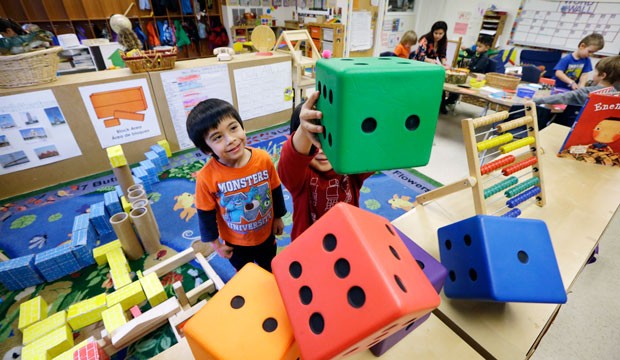Children play at the Creative Kids Learning Center, a school that focuses on pre-kindergarten for 4- and 5-year-olds, in Seattle, Washington, on February 12, 2016. Source: AP/Elaine Thompson
Washington, D.C. —(ENEWSPF)–April 5, 2016. A new analysis released today by the Center for American Progress, or CAP, finds that high-quality universal pre-K would significantly narrow or virtually close achievement gaps in math and reading at kindergarten entry for Hispanic, African American, and low-income children. The report, which was commissioned by CAP and conducted by researchers at the National Institute for Early Education Research, or NIEER, examines the impact of universal pre-K on achievement gaps between Hispanic children and white children, the gaps between African-American children and white children, and the gaps between low-income children and higher-income children. Access to high-quality pre-K for Hispanic, African American, and low-income children lags far behind that of white and higher-income children.
“This research demonstrates what we are losing out on by not implementing a high-quality universal pre-K program on a national scale, and what we stand to gain if we move toward a national, public solution to pre-K,” said Katie Hamm, Senior Director of Early Childhood Policy at the Center for American Progress. “Today’s report adds to the growing body of research surrounding the many benefits of universal pre-K. There is plenty of strong empirical evidence to support expanding pre-K at the national level, but quality is key to positively impacting children’s development.”
“Our study reveals the potential of truly high-quality pre-K for all to greatly reduce inequality while enabling all children to start school better prepared to succeed,” said Steve Barnett, director of NIEER, and coauthor of the report.
The report analysis uses the average effect that two large-scale, highly effective programs—Oklahoma’s Early Childhood Four-Year-Old Program in Tulsa and Boston Public School’s Pre-K Program—had on participating children’s achievement scores. Both programs are high-quality and universal, but also span broadly different populations in the United States. By applying the achievement gains made by children in those two programs to the country as whole, NIEER’s research determined that high-quality universal pre-K would reduce the achievement gap at kindergarten entry in math 78 percent for Hispanic children and 45 percent for African American children, while essentially closing the entire gap in reading for both groups. The estimated effects on kindergarten entry achievement gaps between low-income and higher-income children were also significant: The math gap would be reduced by an estimated 27 percent and the reading gap would be reduced by an estimated 41 percent.
The current gaps in math and reading between Hispanic and white children are equal to about 11 months of learning and almost one year of learning, respectively; the analysis finds that universal pre-K would narrow the gap to 2.4 months of learning, while gaps in reading skills between Hispanic and white children would be virtually eliminated. African American children, meanwhile, are currently nine months behind their white peers in math and about 6.7 months behind in reading. The report analysis suggests that a high-quality universal pre-K program would reduce gaps in math skills 45 percent—equivalent to four months of learning—while gaps in reading would be completely erased.
Click here to read “How Much Can High-Quality Universal Pre-K Reduce Achievement Gaps?” by Allison Friedman-Krauss, W. Steven Barnett, and Milagros Nores.
Source: http://www.americanprogress.org









